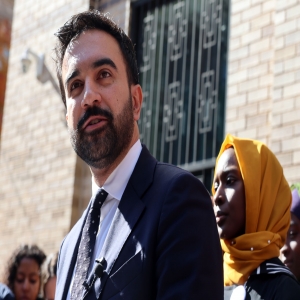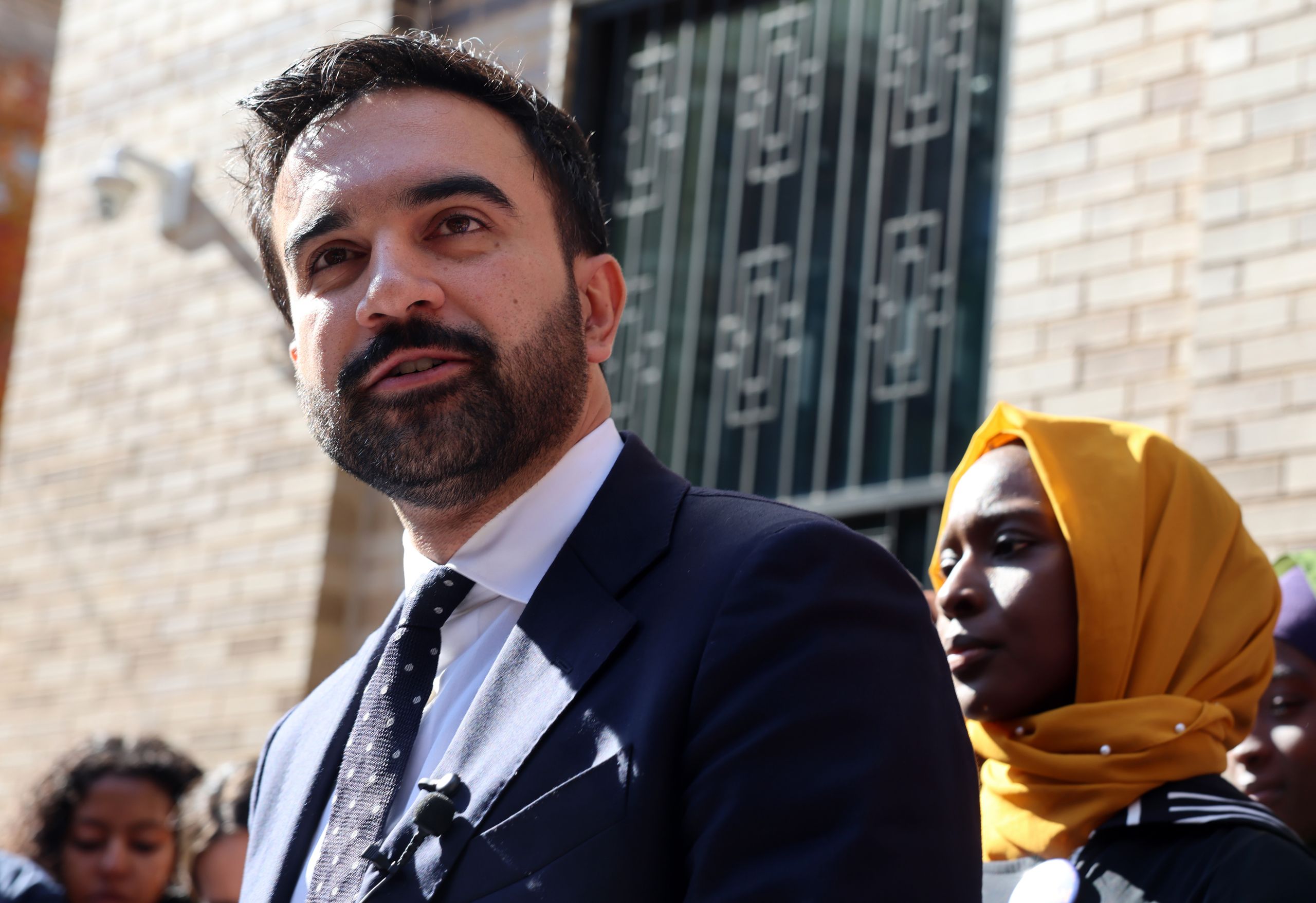
.png) Jacob Peenikaparambil
Jacob Peenikaparambil

The victory of Zohran Mamdani, a democratic socialist, in the historic New York mayoral election is not only a challenge to Donald Trump but also to right-wing political leaders worldwide. His triumph demonstrates that it is possible to unseat far-right, authoritarian leaders who, through their politics of hate, exclusion, arrogance, and hyper-nationalism, have created havoc not only in their own countries but also beyond their borders.
At 34, Mamdani—a Democrat born to Indian and Ugandan immigrants—is poised to become the first Muslim mayor of New York City, as well as the first of African descent and of South Asian heritage to hold the office. When he takes office on January 1, he will also be the youngest mayor in over a century.
Since the global financial crisis of 2008, the world has witnessed a notable rise in support for right-wing and far-right parties and leaders, often characterised by populist, anti-establishment, and nationalist rhetoric. Right-wing political ideologies generally emphasise tradition, social hierarchy, strong authority, conservative religious values, free-market capitalism, anti-immigrant sentiment, ultranationalism, opposition to wealth redistribution, and resistance to environmental regulations—while favouring minimal government intervention in the economy.
Prominent right-wing leaders include US President Donald Trump, Viktor Orbán (Prime Minister of Hungary), Marine Le Pen (Leader of France's National Rally), Giorgia Meloni (Prime Minister of Italy), Nigel Farage (United Kingdom), Jaros?aw Kaczy?ski (Leader of Poland's Law and Justice Party), Jair Bolsonaro (Brazil), Javier Milei (Argentina), Sebastián Piñera (Chile), Narendra Modi (India), and Recep Tayyip Erdo?an (Turkey).
The rise of right-wing movements has led to growing suppression of human rights, freedom of ex
In India, ever since the right-wing Bharatiya Janata Party (BJP), propelled by majoritarian Hindutva ideology, came to power, hatred, violence, and discrimination against Muslims and Christians have escalated. Government policies and administrative actions have frequently reflected bias and intolerance. Muslims are often branded as anti-nationals or terrorists with alleged ties to Pakistan, while Christians are accused of engaging in forced religious conversions. According to the United Christian Forum (UCF), there have been 4,694 attacks on Christians by Hindutva organisations over the past 11 years.
If right-wing politics and ideologies are not countered through movements grounded in social equality, universal human rights, robust democracy, secularism, and international solidarity, the world could face a catastrophe akin to another world war. Fortunately, leaders such as Olaf Scholz (Chancellor of Germany), Alexander Van der Bellen (President of Austria), and Anthony Albanese (Prime Minister of Australia) remain committed to liberal democratic values. Similarly, opposition leaders like Rahul Gandhi in India, Jeremy Corbyn in the United Kingdom, and Bernie Sanders in the United States continue to resist the advance of right-wing forces in their respective countries.
Zohran Mamdani, the newly elected mayor of New York, has emerged as a dynamic and determined opponent of right-wing politics. His very identity embodies inclusion and diversity—values that right-wing ideologies reject. Born in Uganda to parents of Indian descent, Mamdani is the son of acclaimed filmmaker Mira Nair and prominent academic Mahmood Mamdani. The family lived briefly in South Africa before settling in New York when Zohran was seven years old.
Mamdani's political rise has been remarkably swift. Elected to the New York State Assembly in 2020, he announced his mayoral candidacy in October 2024, entering the race as a relatively unknown candidate. Yet his victory in the Democratic primary against former mayor Andrew Cuomo was decisive—he secured 56.4% of the vote.
Mamdani's political vision is rooted in economic and social justice, aiming to make New York City more equitable and affordable for its residents. His agenda prioritises the needs of workers over corporations, challenging the entrenched economic status quo that he believes has left many New Yorkers behind. To fund his ambitious programs, he proposes higher taxes on corporations and the city's wealthiest residents.
A key focus of his platform is tackling the high cost of living, particularly housing. With average rents skyrocketing—a three-bedroom apartment reportedly costs about $8,500 (?7,53,000 approx.) per month—Mamdani has promised a four-year rent freeze for all rent-stabilised apartments and a plan to triple the number of permanently affordable, union-built housing units.
He also plans to make public transportation more accessible by making city buses "fast and free," expand universal childcare for all children from six weeks to five years old, and introduce a minimum wage of $30 (?2,600 approx.) per hour by 2030. His proposal to establish a network of city-run grocery stores aims to ensure that all residents have access to affordable food.
On public safety, Mamdani supports maintaining current police staffing levels while establishing a new Department of Community Safety to deploy mental health professionals for non-violent crisis calls, emphasising community-based solutions.
Internationally, Mamdani has distinguished himself as a strong advocate for human rights. He has been a vocal supporter of Palestinian rights and an outspoken critic of Israel's military operations in Gaza—stances that have defined his political identity.
To fund his social programs, he has proposed a flat 2% tax on city residents earning over $1 million annually, as well as higher corporate taxes.
Mamdani's political movement draws strength from grassroots organising, particularly through the Democratic Socialists of America (DSA) and numerous community-based groups. His left-wing policies have generated significant enthusiasm among young voters and working-class communities, despite facing strong opposition from conservative and wealthy elites.
His policies stand in direct contrast to those of right-wing leaders, particularly Donald Trump. For this reason, many observers have noted that few US elections outside of a presidential race have attracted as much global attention as New York's mayoral contest.
On the eve of the election, President Trump endorsed independent candidate Andrew Cuomo—who had lost the Democratic primary to Mamdani—urging New Yorkers to "vote for Cuomo" to prevent a Mamdani victory. Even before the declaration of Mamdani's win, Trump lashed out, labelling him a "communist lunatic" and warning that federal support for New York would be reduced to "the bare minimum." Mamdani responded by saying he would work with the president for the good of the city but "would not be cowed."
With their political views starkly opposed, relations between President Trump and Mayor-elect Mamdani are expected to become yet another battleground in American politics.
Zohran Mamdani's victory gives hope to Indians resisting Hindutva majoritarianism. In his victory speech, Mamdani quoted from Jawaharlal Nehru's historic address, "Tryst with Destiny": "A moment comes, but rarely in history, when we step out from the old to the new, when an age ends, and when the soul of a nation, long suppressed, finds utterance. Tonight, we have stepped out from the old into the new," Mamdani said, echoing Nehru's timeless words.
India, too, can step out from the clutches of Hindutva fascism—provided Indian liberals can summon the same courage and conviction that Mamdani embodies. His rise offers valuable lessons for progressive leaders everywhere, especially in India, on how integrity, solidarity, and moral clarity can triumph over fear and divisiveness. Liberals from all over the world can learn some lessons from Mamdani:
1. Prioritise people's needs: Focus on employment creation, quality education and healthcare, gender equality, and equal rights for all religions.
2. Offer a positive vision: Inspire hope through clear, constructive policies rather than simply opposing one's rivals.
3. Stand for global justice: Be courageous in speaking out for human rights everywhere, as Mamdani has done regarding the Palestinian cause. He repeatedly criticised Modi's exclusionary Hindutva ideology.
4. Build grassroots movements: His campaign was powered by tens of thousands of volunteers who knocked on over a million doors.
5. Engage youth and digital media: Mamdani effectively used platforms like TikTok to connect with younger voters in authentic ways. For India, where Modi's BJP has dominated national politics for over a decade, Mamdani's trajectory offers evidence that persistent campaigns built on youth energy and grassroots organising can overcome entrenched political figures like Andrew Cuomo.
6. Stay present year-round: His consistent engagement with diverse ethnic and religious communities has built trust and credibility far beyond election season.
Zohran Mamdani's victory is not just a milestone for New York—it is a powerful reminder that inclusive, progressive, and people-centred politics can still triumph over fear, division, and hate.